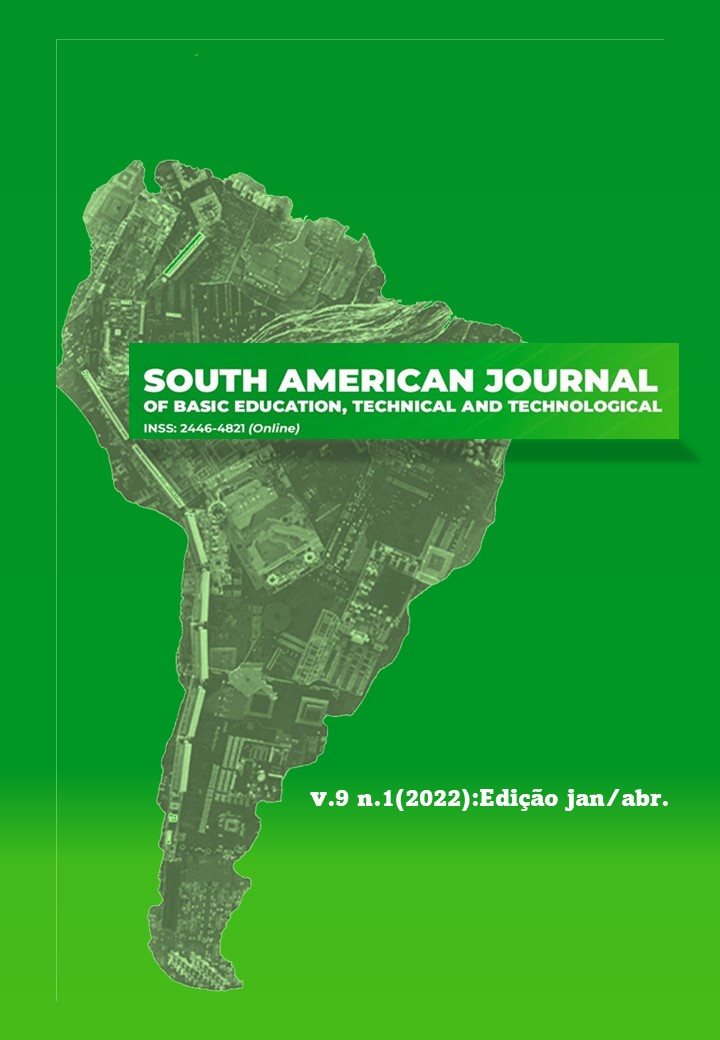VIRTUAL MEDIATION IN THE COVID-19 PANDEMIC: THE USE OF SIMULATIONS FOR TEACHING CHEMISTRY
Keywords:
Virtual Mediation, Teaching-Learning, Computer simulations, ChemistryAbstract
The Brazilian educational sphere, as well as other social spheres, was immensely damaged with the advent of the COVID-19 pandemic, requiring an emerging process of adaptation of classroom teaching to the remote one, in order to ensure one of the fundamental rights to all, quality education. Thus, this work, which is characterized as an experience report, was developed from the participation in the virtual mediation program of the Federal Institute of Rondônia (IFRO), a project in effect between the months of September and January 2020. It is about actions in which simulations of the PhET Colorado platform were used in the subject of Chemistry, with the students of the 1st year of the technical course in Chemistry of the IFRO Ji-Paraná campus, with the central objective of assisting in the teaching-learning process, using the mediation approach by virtual means and a tool that has great methodological potential, in this case, computer simulations. In view of the observations made and the results obtained, the importance of this didactic strategy is evident, considering that, by means of this project, the students could be the protagonists of their own learning, and this approach was efficiently evaluated by them, even in the face of this atypical situation. In addition, the approach of the graduate of the course of Chemistry to the students of technical high school represented a great contribution to academic, professional and personal development.
Downloads
References
FURNALETO, Audrey. Covid-19: especialistas discutem rumos da educação brasileira após fim do isolamento social. O Globo. 11 de abr. 2020. Seção: Sociedade. Disponível: <https://oglobo.globo.com/sociedade>. Acesso em: 30 de dez. 2020.
SILVA, Mayara Gobetti Fernandes da; LOPES, Aline Chitto; SANTOS, Larissa Macedo dos. Monitoria como processo de ensino-aprendizagem e formação de futuros professores de Química. III Simpósio Nacional de Ensino de Ciência e Tecnologia. Ponta Grossa/PR: 2012. Disponível em: <http://www.sinect.com.br/anais2012/html/artigos/ensino%20qui/22.pdf>. Acesso em: 02 de fev. 2021.
QUEIROZ, C. R. A. A.; SILVA, R. M. S. Monitoria orientada: uma possibilidade para melhoria do desempenho acadêmico na disciplina química. Rev. Ed. Popular, Uberlândia, v.8, p.125-137, jan. 2009.
MAGALHÃES, G.L.N.; ARAÚJO, K.S.; SOUSA, S.F.; BARROS, I.N.G. SOUSA, A.A.A.; SOUSA, J.L.S. Computador e software na Educação de Jovens e Adultos (EJA): a utilização no processo de ensino e aprendizagem na E. M. Frei Benjamin de Borno no município de Grajaú, Maranhão. In: SIMPÓSIO BRASILEIRO DE EDUCAÇÃO QUÍM http://www.abq.org.br/simpequi/2015/trabalhos/90/6867-20714.html ICA, 13., 2015, Fortaleza. Anais eletrônicos. Fortaleza: ABQ, 2015. Disponível em:<http://www.abq.org.br/simpequi/2015/trabalhos/90/6867-20714.html>. Acesso em: 28 de jan. 2021.
FREIRE, A. A. C.; VALENZUELA, G. M.; OLIVEIRA, H. G.; CARVALHO, L. M.; JUNIOR, O. H.; SILVA, W. A.A utilização de softwares educacionais simuladores no ensino da física em uma escola pública estadual da cidade de Boa Vista/RR. Revista Renote, Porto Alegre, v. 12, n. 1, 2014.
SANTOS, Lucelia Rodrigues dos; MENEZES, Jorge Almeida de. A experimentação no ensino de Química: principais abordagens, problemas e desafios. Rev. Eletrônica Pesquiseduca. Santos, Volume 12, número 26, p. 180-207, jan.-abril, 2020. Disponível em: <https://periodicos.unisantos.br/pesquiseduca/article/view/940/pdf>. Acesso em 20 de jan.2021.
ALBERGARIA, Mayara Bezerra de. Caracterização das principais dificuldades de aprendizagem em química de alunos da 1° série do ensino médio. Trabalho apresentado como exigência parcial da Disciplina TCCII do Curso de Licenciatura em Ciências Naturais – FUP UnB. Brasília: 2015. Disponível em: <https://bdm.unb.br/bitstream/10483/13838/1/2015_MayaraBezerradeAlbergaria.pdf>. Acesso em: 20 de jan.2021.










